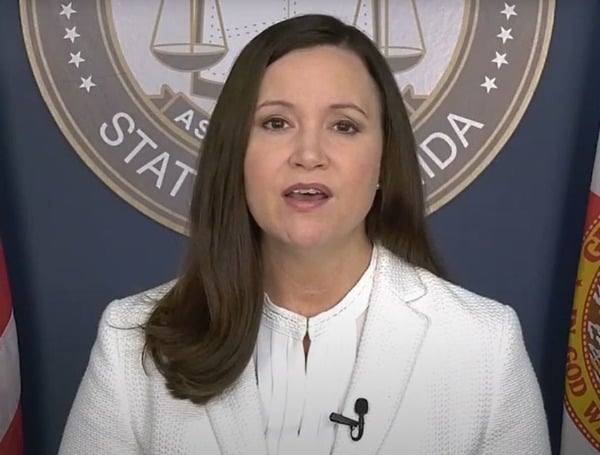Florida Attorney General Ashley Moody has joined 19 other GOP state attorneys general in fighting back against President Joe Biden’s gun-control agenda.
Late last week, the law enforcement officials, led by Patrick Morrisey and Mark Brnovich, the attorneys general of West Virginia and Arizona, respectively, wrote a letter to acting ATF Director Marvin Richardson objecting to how the federal government wants to regulate so-called “ghost guns.”
Ghost guns are firearms assembled from kits by do-it-yourselfers. The guns are untraceable because they do not have serial numbers as required by manufacturers or federally licensed dealers.
The Biden administration, backed by blue-state AGs wants stricter regulation of these weapons, claiming they are becoming a greater crime menace.
The issue, however, as the Republican AGs pointed out, the 1968 Gun Control Act, the prevailing gun national control law, does not grant the administration the authority to regulate these guns.
The AGs pointed out that this proposed rule by Biden is another end-run around existing gun laws.
The Bureau of Alcohol, Tobacco, Firearms, and Explosives proposed rule “appears to be an effort to regulate firearm parts, which is beyond the scope of the ATF’s authority under the Gun Control Act of 1968,” the GOP officials wrote.
They pointed out that “that a large number of parts manufacturers would likely be put out of business if the proposed rule is adopted. Private individuals have the right to assemble firearms for their own use — a fact borne out in early American history and expressly recognized by the Gun Control Act,” the added. “The proposed rule treats this activity as a problem to be stamped out, rather than a right and tradition to be respected.
For this reason, they asked that it be reconsidered.
Tom Chittum, a director of ATF field operations in the Trump administration, made this same point in April 2020 in a call to the Presidential Commission on Law Enforcement.
“An unlicensed person can privately make a firearm and is no under obligation to place a serial number on it, nor register it. And this is lawful, as long as the person’s activities are not to such an extent they’d be considered engaged in the business,” Chittum told the group.
Chittum also noted that the Gun Control Act also has provisions policing unlicensed arms dealers.
This year, as the comment period on the Biden rule closed, the GOP AGs said in their letter that the ATF is “proposing a monumental shift in the landscape of firearms regulation.”
The group said the ATF seeks to solve two “purported” problems.
The first is that, per the courts, the ATF cannot prosecute people who possess parts of firearm receivers only, instead of the whole component.
The second is that technological advances in gun0making have made it easier for unlicensed people to assemble firearms at home from standalone parts.
“Neither of these circumstances violate the GCA — there is nothing surprising about not being able to regulate certain conduct where Congress deliberately chose definitions that do not encompass every aspect of firearm parts manufacturing,” the AGs wrote.
“Apparently disagreeing with this policy choice, however, ATF proposes a sweeping range of changes designed to crack down on these activities by expanding the universe of regulated firearm parts.”
The AGs also pushed back on the idea that ghost guns are a crime-causing problem – one that could be cured by more regulation, including background checks.
“Simply pointing to the presence of privately made firearms at crime scenes implicitly assumes that criminals themselves assemble their own firearms. But the opposite is true,” they wrote. They cited a 2016 survey of imprisoned criminals themselves and found when asking about acquiring guns, they “did not even receive enough reports of self-assembled firearms to warrant its own category.”
“The largest source by far was black market sales, and ATF has already acknowledged that ‘guns are brought to the black market in two main ways: gun store burglaries and straw purchasers.’” the letter continued. In fact, almost 39 percent of criminals either steal guns or obtain them from friends or family members in “insignificant proportions.”
“To the extent that privately assembled firearms are becoming more common, they would account for a larger share of firearms making their way to crime scenes through established channels rather than illustrating that criminals are specifically gravitating towards such firearms or making them themselves,” the GOP AGs argued.
“Expanding the background check requirement only deters prohibited persons from obtaining firearm parts, but not all individuals who go on to commit crimes were prohibited persons at the time they obtained their firearm,” they added. “Indeed, more criminals reported undergoing a background check when obtaining their firearm than reported building their own.”
Support journalism by clicking here to our GoFundMe or sign up for our free newsletter by clicking here
Android Users, Click Here To Download The Free Press App And Never Miss A Story. It’s Free And Coming To Apple Users Soon


Last time I checked there were 2, two homicides committed with these weapons. Why are they doing this?
Biden is just trying an end run but he will fail.